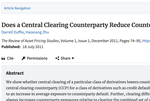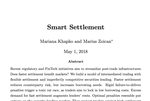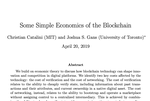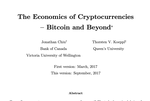Additional Content
.js-id-session1
Dark Pool Trading System & Regulation
The effective regulation of “dark pools”, which are private forums for trading securities, is necessary to secure efficient trade execution, and to ensure transparent and fair markets as a means of fostering confidence and trust in trading markets.
n.d., CFA Institute
n.d., CFA Institute
Blockchain disruption and decentralized finance - The rise of decentralized business models
Blockchain technology can reduce transaction costs, generate distributed trust, and empower decentralized platforms, potentially becoming a new foundation for decentralized business models.
June 2020, Yan Chen & Cristiano Bellavitis
June 2020, Yan Chen & Cristiano Bellavitis
Does a Central Clearing Counterparty Reduce Counterparty Risk?
We show whether central clearing of a particular class of derivatives lowers counterparty risk. For plausible cases, adding a central clearing counterparty (CCP) for a class of derivatives such as credit default swaps reduces netting efficiency, leading to an increase in average exposure to counterparty default.
July 18, 2011, Darrell Duffie & Haoxiang Zhu
July 18, 2011, Darrell Duffie & Haoxiang Zhu
Why finance is deploying natural language processing
Big data in finance refers to large, diverse (structured and unstructured) and complex sets of data that can be used to provide solutions to long-standing business challenges for financial services and banking companies around the world.
Nov 3, 2020, Tracy Mayor
Nov 3, 2020, Tracy Mayor
Session 10 Quiz
This quiz will count towards your individual participation grade. Ensure you have completed all mandatory readings before starting the quiz (they will be tested). Please note that these quizzes are being assessed on a participation basis only; full marks will be given to those that complete the quiz (scores will not affect the participation grade).
Session 11 Quiz
This quiz will count towards your individual participation grade. Ensure you have completed all mandatory readings before starting the quiz (they will be tested). Please note that these quizzes are being assessed on a participation basis only; full marks will be given to those that complete the quiz (scores will not affect the participation grade).
Session 2 Quiz
This quiz will count towards your individual participation grade. Ensure you have completed all mandatory readings before starting the quiz. Only entries submitted prior to the beginning of next class will be accepted. Please note that these quizzes are being assessed on a participation basis only; full marks will be given to those that complete the quiz (scores will not affect the participation grade).
Session 3 Quiz
This quiz will count towards your individual participation grade. Ensure you have completed all mandatory readings before starting the quiz. Only entries submitted prior to the beginning of next class will be accepted. Please note that these quizzes are being assessed on a participation basis only; full marks will be given to those that complete the quiz (scores will not affect the participation grade).
Session 4 Quiz
This quiz will count towards your individual participation grade. Ensure you have completed all mandatory readings before starting the quiz (they will be tested). Only entries submitted prior to the beginning of next class will be accepted. Please note that these quizzes are being assessed on a participation basis only; full marks will be given to those that complete the quiz (scores will not affect the participation grade).
Session 5 Quiz
This quiz will count towards your individual participation grade. Ensure you have completed all mandatory readings before starting the quiz (they will be tested). Only entries submitted prior to the beginning of next class will be accepted. Please note that these quizzes are being assessed on a participation basis only; full marks will be given to those that complete the quiz (scores will not affect the participation grade).
Session 6 Quiz
This quiz will count towards your individual participation grade. Ensure you have completed all mandatory readings before starting the quiz (they will be tested). Only entries submitted prior to the beginning of next class will be accepted. Please note that these quizzes are being assessed on a participation basis only; full marks will be given to those that complete the quiz (scores will not affect the participation grade).
Session 8 Quiz
This quiz will count towards your individual participation grade. Ensure you have completed all mandatory readings before starting the quiz (they will be tested). Only entries submitted prior to the beginning of next class will be accepted. Please note that these quizzes are being assessed on a participation basis only; full marks will be given to those that complete the quiz (scores will not affect the participation grade).
Session 9 Quiz
This quiz will count towards your individual participation grade. Ensure you have completed all mandatory readings before starting the quiz (they will be tested). Only entries submitted prior to the beginning of next class will be accepted. Please note that these quizzes are being assessed on a participation basis only; full marks will be given to those that complete the quiz (scores will not affect the participation grade).













































